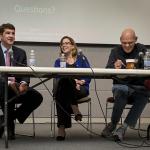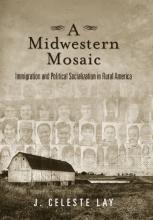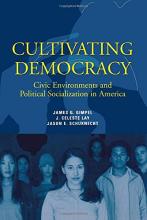J. Celeste Lay
Associate Professor & Associate Chair

Areas of Expertise
Biography
I am an associate professor and the associate chair in the department of political science at Tulane University. I earned my Ph.D. in Government and Politics at the University of Maryland, College Park in 2004 and my B.A. in Political Science from the College of Charleston in 1998. I authored A Midwestern Mosaic: Immigration and Political Socialization in Rural America, as well as several peer-reviewed political science journals. My research broadly examines political behavior, including political socialization, public opinion and voting behavior. In addition to understanding how children’s attitudes toward politics develop, I am most interested in the interplay between political attitudes and knowledge about public policy – especially immigration and education policy – and voting and support for political parties and candidates. I am the director and creator of the Summer Minor Program in U.S. Public Policy at Tulane and I’m the co-director for the New Orleans chapter of the Scholars Strategy Network, a nationwide organization dedicated to bridging academia and public policy.
Education
University of Maryland, College Park
College of Charleston
Accomplishments
Newcomb College Institute Oak Wreath
2019, 2017
Elsie Hillman Prize
2018
Pennsylvania Center for Women and Politics at Chatham University, with Mirya Holman, Angie Bos, Jill Greenlee, and Zoe Oxley
Honors Professor of the Year
2017
Tulane University Honors Program
Roberta Sigel Junior Scholar Paper Award
2002
International Society of Political Psychology, “Patriotism and Political Participation among Russian and American Adolescents,” with Judith Torney-Purta
Links
Articles
TIME for Kids to Learn Gender Stereotypes: Analysis of Gender and Political Leadership in a Common Social Studies Resource for Children
While early gendered messages mold children's expectations about the world, we know relatively little about the depictions of women in politics and exposure to gender stereotypes in elementary social studies curricula. In this article, we examine the coverage of political leaders in the children's magazine TIME for Kids, a source commonly found in elementary school classrooms. Coding all political content from this source over six years, we evaluate the presence of women political leaders and rate whether the leaders are described as possessing gender-stereotypic traits. Our results show that although TIME for Kids covers women leaders in greater proportion than their overall representation in politics, the content of the coverage contains gendered messages that portray politics as a stereotypically masculine field. We show that gendered traits are applied differently to men and to women in politics: feminine and communal traits are more likely to be applied to women leaders, while men and women are equally described as having masculine and agentic traits. Portrayals of women political leaders in stereotype-congruent ways is problematic because early messages influence children's views of gender roles.
Policy Learning and Transformational Change: University Policies on Sexual Harassment
This essay comes out of my experience as an attendee at the #MeTooPoliSci short course in the American Political Science Association meeting in 2018. I use the framework of policy feedback theory to explain the difficulty in reforming sexual harassment policies at universities and prescribe some actions we as scholars can take to improve the situations at our places of employment.
They See Dead People (Voting): Correcting Misperceptions about Voter Fraud in the 2016 U.S. Presidential Election
The 2016 US Presidential election was unique for many reasons, especially the widespread endorsement of falsehoods about the candidates and the electoral process. Using a unique experiment fielded the week prior to the election, we examine whether correcting information can overcome misperceptions about election fraud. We find that providing counter information is generally ineffective at remedying misperceptions and can, depending on the source, increase endorsements of misperceptions among Republicans. Although information from a fact-checking source is generally unconvincing, when given with evidence from an unlikely source – in our experiment, Breitbart News – both Republicans and Democrats decrease beliefs in voter fraud.
Private Governance of Public Schools: Representation, Priorities, and Compliance in New Orleans Charter School Boards
In many cities, charter schools make up an increasing proportion of public schools, substantially altering education governance. In New Orleans, nearly every public school student attends a charter school. Each charter school or network has its own private governing board responsible for obtaining and maintaining the school’s charter, school finances, and hiring school leadership. We know relatively little about the composition, priorities, or effectiveness of these boards. In this article, we find that New Orleans’s charter boards are unrepresentative, are focused on fiduciary responsibilities rather than academics, and routinely fail to comply with state transparency laws. As more schools and other public services in urban areas move to private governance, it is important to examine the people who compose the boards, their decision-making processes, and the extent of public involvement. New Orleans provides a cautionary tale of how this governance system could operate in other cities with growing charter sectors.
The Buck Stops with the Education Mayor: Mayoral Control and Local Test Scores in U.S. Urban Mayoral Elections
Several U.S. cities have turned control of their schools from elected boards to the mayor. Advocates of mayoral control have argued that this structure allows voters to hold the mayor directly accountable for the performance of local schools. Now that public schools have to report their test scores each year, it is possible for voters to attribute responsibility for test scores. This article analyzes survey data from 16 cities in the United States that have been matched with data on test scores. We find that, in general, test score changes are not associated with support for incumbent mayors, except in districts with mayoral control, where voters reward incumbents when test scores rise. Further, voters' beliefs about local schools condition their support for the incumbent. In cities with mayoral control, voters who evaluate schools positively reward mayors while voters who believe their schools are poor are not swayed by this positive information.
Media Appearances
New Orleans finally has control of its own schools, but will all parents really have a say?
J. Celeste Lay, a Tulane political science professor who studies education policy, sees a pattern in who is succeeding in this new era. Lay points to a group of parents who were able to save, at least temporally, Cypress Academy, a racially and socioeconomically diverse charter school with a reputation for serving students with disabilities well. That school was set to close at the end of last school year due to budgetary issues. The school board spared it after a group of parents, many white and middle class, organized to save the school.
Why fact checks on 'fake news' don't change minds
“Our experimental results demonstrate that Republicans are more likely to correct their false information when cued with the ideologically consistent source, while Democrats were more persuaded by the ideologically inconsistent source,” says coauthors Mirya Holman and J. Celeste Lay, associate professors of political science at Tulane University’s School of Liberal Arts. “Neither group sharply corrected their beliefs when confronted with information from the fact-checking organization.”
State takeovers of schools are about political power, not school improvement
Over 7,000 school employees lost their jobs in the year following Katrina and governance authority has shifted from the locally elected school board to the state-created board and to the individual governing bodies of each charter school. Recent research by J. Celeste Lay and Anna Bauman of Tulane University shows that 60 percent of the charter board members in New Orleans are white, while the majority of the city and student population is black.
An Analyst: Why didn’t Bagneris beat out Cantrell or Charbonnet?
Even with the momentum currently in the councilwoman’s favor, the equal danger for Cantrell rests in Charbonnet’s ability to win the African-American voters who cast their ballots for Henry. Tulane University professor J. Celeste Lay told The Times-Picayune that data taken from a focus group whom she assembled showed the six percent of the electorate captured by Troy Henry could go mostly to Charbonnet.
Hillary Clinton vs Bernie Sanders: In-depth Report on Exit Polling and Election Fraud Allegations
Professor J. Celeste Lay agreed, pointing to youth voting and early or absentee voting as key factors that could be resulting in exit polling errors. She argued, “Most of this discussion is driven by Sanders supporters who are disappointed he is not winning and want to claim he has more support in the Democratic Party than he actually does.” She added, “Until proven otherwise, I’ll go with the numerous studies demonstrating the infinitesimal amount of voter fraud in U.S. elections.”






